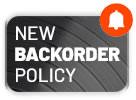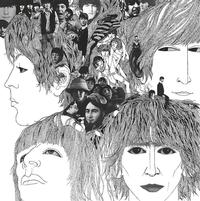The Beatles - Revolver
(New Stereo Mix)
| Label: |
Capitol |
| Genre: |
Pop/Rock |
| Product No.: |
ACAP 4559969
|
| UPC: | 602445599691 |
| Availability: |
In Stock
|
| Category: |
180 Gram Vinyl Record |
180-gram single LP reissue
New stereo mix by Giles Martin (son of original producer George Martin) and engineer Sam Okell
Sourced directly from the original 4-track master tapes
Rolling Stone 500 Greatest Albums of All Time - Rated 11/500!
"Revolver was the sound of the Beatles fully embracing the recording studio as a sonic canvas, free to pursue musical ideas and possibilities that would reshape rock forever." — Rolling Stone
From "Taxman" to "Tomorrow Never Knows," The Beatles' Revolver has been newly mixed by producer Giles Martin and engineer Sam Okell, and sourced directly from the original 4-track master tapes with audio brought forth in stunning clarity with the help of cutting-edge technology developed by the award-winning sound team at Peter Jackson's WingNut Films Productions Ltd. Now available on 180-gram vinyl.
Revolver was The Beatles' 1966 album that changed everything. Spinning popular music off its axis and ushering in a vibrant new era of experimental, avant-garde sonic psychedelia, Revolver brought about a cultural sea change and marked an important turn in The Beatles' own creative evolution. With Revolver, John Lennon, Paul McCartney, George Harrison, and Ringo Starr set sail together across a new musical sea.
On October 28, 2022, Revolver will be released worldwide in a range of beautifully presented, newly mixed and expanded Special Edition packages by Apple Corps Ltd./Capitol/UMe.
The Revolver album's 14 tracks have been newly mixed by producer Giles Martin and engineer Sam Okell in stereo and Dolby Atmos, and the album's original mono mix is sourced from its 1966 mono master tape.
All the new Revolver releases feature the album's new stereo mix, sourced directly from the original 4-track master tapes. The audio is brought forth in stunning clarity with the help of cutting edge de-mixing technology developed by the award-winning sound team led by Emile de la Rey at Peter Jackson's WingNut Films Productions Ltd.
Across all the configurations, Revolver's Special Edition showcases the Grammy-winning original album artwork created by The Beatles' longtime friend, German bassist and artist Klaus Voormann.
After the December 1965 release of their groundbreaking album, Rubber Soul, and after wrapping up that year's tour dates, a late decision to cancel shooting plans for a third Beatles film, A Talent For Loving, would have a significant effect on the creation of Revolver. The time allocated for filming and recording songs for a soundtrack was removed from the band's schedule, allowing the group to take a four-month break before the Revolver recording sessions began. "One thing's for sure," John said a few weeks before the band's return to the studio, "the next LP is going to be very different."
On April 6, 1966, The Beatles gathered in Studio Three at EMI Studios (now called Abbey Road Studios) for their first Revolver recording session. With their producer George Martin flanked by recording engineer Geoff Emerick and technical engineer Ken Townsend, they went in blazing, starting with "Tomorrow Never Knows." John's ethereal vocals (fed from his mic through a rotating Leslie speaker), innovative tape loops — including Paul saying ‘ah, ah, ah, ah', which when sped up produced a sound similar to a seagull's screech — converge with Ringo's thunderous drum pattern, George's tamboura drone, and a backwards guitar solo. "Tomorrow Never Knows" propelled The Beatles and popular music into exciting new terrain. In an interview before Revolver's August 5, 1966 release, Paul explained to NME, "We did it because I, for one, am sick of doing sounds that people can claim to have heard before." Revolver's Special Edition also features The Beatles' first take of "Tomorrow Never Knows" from the April 6 session and a mono mix that was issued on a small number of records before the LP was recut with the correct version.
The next day, The Beatles returned to Studio Three, completed most of their "Tomorrow Never Knows" recording, and started work on the first version of "Got To Get You Into My Life."
One of George's most important songwriting influences is heard in "Love You To." The previous year, his deepening interest in Indian music and learning how to play sitar had brought him together with Ravi Shankar, who became his close friend and occasional musical collaborator. The Beatles began recording "Love You To" in Studio Two on April 11, the third anniversary of the U.K. release of "From Me To You." Taken with the whole of Revolver, the short three-year span between these songs illuminates the band's astonishing creative progression.
"It was one of the first tunes I wrote for sitar," George later recalled. "This was the first song where I consciously tried to use the sitar and tabla on the basic track." With George on sitar and vocals, Paul on tamboura and vocal harmony, and university student Anil Bhagwat on tabla, the song's intricate arrangement began to take shape over several takes.
Between April 13 and 16 in Studios Two and Three, The Beatles recorded their chart-topping "Paperback Writer" single (with layered harmonies, riffing guitars, and Paul's booming bass lines) and its B-side "Rain" (achieved with tape machines slowed down for the recording and mixing processes). Prior to the single's release on June 10 (May 30 in the U.S.), The Beatles spent a couple of days away from recording to shoot several promotional films for both songs with director Michael Lindsay-Hogg, who would later direct the Let It Be film.
The album's opening track, "Taxman", was recorded across three Studio Two sessions in April and May. One of three songs on the album by George, in "Taxman" he expresses his frustration with the U.K.'s "super-rich" tax rate at the time (90%), with a vocal wink to the "Batman" TV theme song. In a 12-hour session on April 20, The Beatles recorded and mixed the first version of "And Your Bird Can Sing" (for this song, the Special Edition features two Version One/Take 2 recordings and Version Two's Take 5), then began recording "Taxman". They returned to the song the next day, laying down George's foundational guitar, Paul's bass and his dynamic, raga-style guitar solo, and Ringo's drums and cowbell.
"Yellow Submarine" was recorded on May 26 and June 1 in Studios Three and Two, respectively. The iconic, sunny rite of singalong passage for children everywhere and a favorite for the young-at-heart began quite differently than it finished. Parts 1 and 2 of the Special Edition's songwriting work tape for "Yellow Submarine" reveal the song's evolution from a rather sad verse sung by John over acoustic guitar — "In the town where I was born / No one cared, no one cared..." — to its adaptation by John and Paul to suit the jollier subject matter of the chorus.
The Beatles' final Revolver recording session took place in Studio Two on the evening of June 21, 1966 into the wee hours of June 22, just one day before the band traveled to Munich to start their international summer tour. The lyrics for "She Said She Said" drew upon the memory of a disorienting day of misadventure The Beatles had experienced in Los Angeles. Having received George's help to create a whole new song from some unfinished fragments, John led the group through the rehearsals and recording while the clock ticked away the last remaining session time.
By 4 am on June 22, The Beatles finished "She Said She Said," wrapping up their Revolver recording sessions. The album's final mono and stereo mixes were completed that evening, and the next day The Beatles were once again off and running on tour. They would next return to Abbey Road in November 1966 to begin recording Sgt. Pepper's Lonely Hearts Club Band.
Released on August 5, 1966, Revolver spent seven weeks at number one on the U.K. albums chart, and a double A-side single with "Eleanor Rigby" and "Yellow Submarine" topped the U.K. singles chart for four weeks in August and September. In the U.S., Capitol released an 11-track version of Revolver, which spent six weeks at No. 1 on Billboard's albums chart.
| Side A | 1. Taxman | 2. Eleanor Rigby | 3. I'm Only Sleeping | 4. Love You To | 5. Here, There and Everywhere | 6. Yellow Submarine | 7. She Said She Said | Side B |
1. Good Day Sunshine | 2. And Your Bird Can Sing | 3. For No One | 4. Doctor Robert | 5. I Want to Tell You | 6. Got to Get You Into My Life | 7. Tomorrow Never Knows |




 (4.50 Stars) 2 person(s) rated this product.
(4.50 Stars) 2 person(s) rated this product. |
|||
|
|||
|
|||
| Write a review and let people know what you think of this product OR just rate it. | |||
|
View other items by The Beatles |
|
 In-Stock Music Orders Over $99 SHIP FREE Within The Continental U.S.
In-Stock Music Orders Over $99 SHIP FREE Within The Continental U.S.







 Login
Login
 My Account
My Account
 Cart
Cart Wishlist
Wishlist
 Contact
Contact





